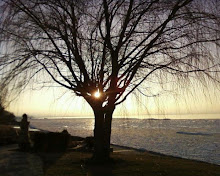I often think of my family
during the Holidays, even though they’ve been gone for decades.
It feels like just a few years ago that I could smell the yeasty goodness of bread rising, and hear the slap of cards as my Grandparents and Godparents played marathon rounds of Pinochle at the white enamel kitchen table. My Mom died in 1969, when I was just 14, my Dad and Grandma passed in 1976, and Grandpa in 1980.
Both my father and grandfather
had been soldiers. Daddy had been in
WWII and my Grandfather, who’d lied about his DOB to join the army at 16
said he started out chasing Poncho Villa across Mexico and saw many years
of action until he went MIA for eighteen months and returned from the War a morphine addict. My father became an alcoholic. This was a time when the
word wasn’t uttered, especially for a ‘functional’ alcoholic, like my dad who
did not drink every day and never while he worked. It killed him just the same.
I have come to understand the
intimate role war played in sculpting the dysfunction that ran through our
family. I was always terrified that someone was going to die. I can only
imagine how my Grandmother might have felt when Grandpa was returned to her
with a metal plate in his head, a collapsed lung, and a serious morphine
addiction. (Which he kicked, cold turkey, once he realized that the government
wouldn’t help him quit)
My father and grandfather told stories about their war experiences. The
same stories. Over and over, as if the words, like water, would help clean away
the anger and bitterness, the horror and pain, which I think is exactly how it
worked.
What veterans experienced is utterly lost on
the rest of us, even with the most graphic descriptions they can provide. Life, when it is about death and survival
every minute of every day, rewires the brain, alters the nervous system and
establishes a series of patterns and filters that the rest of us simply cannot
comprehend. Yet after these men and women have been forever altered
by the mythic experiences encountered in warfare, we expect them to return and
reenter society as if they could unsee and unknow that experience. War is perhaps the darkest possible
interaction with fellow human beings we can have. They need and deserve support and a way find a
new place in society in which they feel received, honored and included.
Those who have been in war
have sacrificed their lives- not only those who have died- but those who have
returned as well. The lives that they might have had may be as distant as the
people they once were before they were trained to be killers and survivors. It
is a terrible price to pay, for which our veterans neither receive proper compensation
nor understanding.
Every family member of a war
veteran is also changed by having had a loved one at war. The level of fear, of
panic, of negative expectation doesn’t vanish because their loved one has
returned. Depending on what happened he or she may barely resemble the person
who went to war. And of course, there
are those who return so physically and/or emotionally damaged that their
families never stop mourning the loss of their beloved, even though they see
them every day.
My family and my subsequent
experience with returning Viet Nam veterans and later with other Vets has made
me more sure than ever that there must be a better way to resolve the world’s
ills, but I am not so foolish to think that we will evolve into a peaceful
planet within my lifetime.
Perhaps this year you may
take a stand for a Peaceful future by helping our Veterans feel wanted and
welcomed back into our midst.
Volunteer: http://www.voa.org/help-local-veterans
Suggested read: WAR AND THE SOUL
by Edward Tick





No comments:
Post a Comment